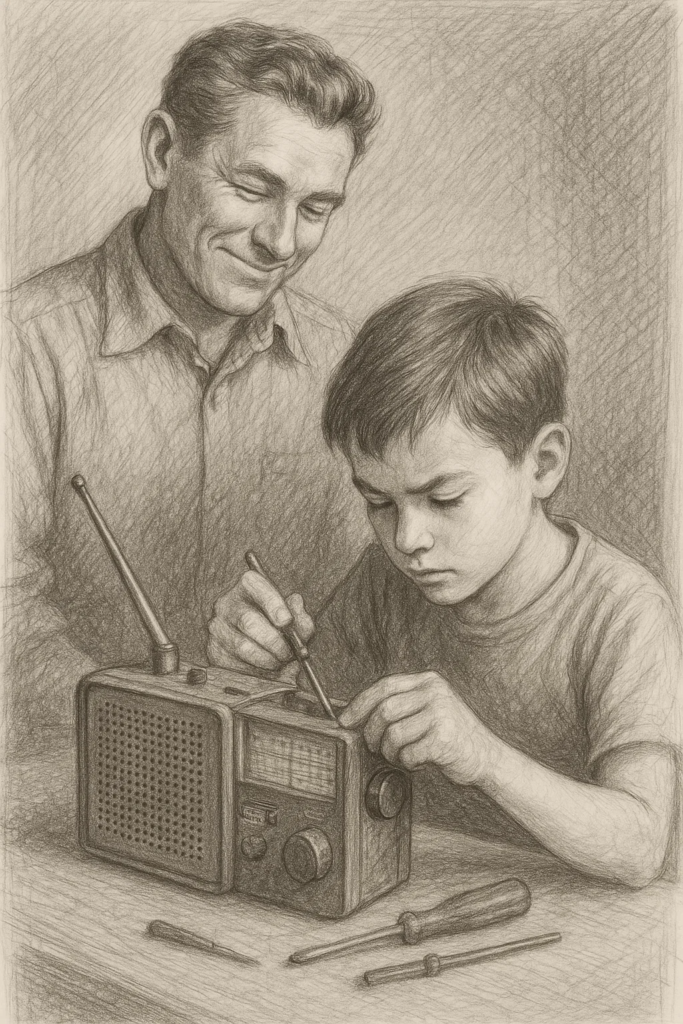Rajiv Verma was a staunch believer that marks built futures. He had been the most studious in his class, and he never once allowed that belief to waver. Every time he saw headlines like “College Dropouts Are Building Businesses”, his face turned red. With a deep sense of regret that he had to live in the same world as those people, he’d mutter:
“See how low we’ve stooped. Is there any chivalry left? These nincompoops won’t stand a chance in the long run.”

He turned the page so fast he tore it in half.
“Such will be the society, downtrodden and split in two, with no real ambition,” he thought bitterly.
As a retired government employee, Rajiv saw life in grades and designations, a neat grid on an Excel sheet where each cell led logically to the next: school, college, job, pension.
He had a son in his late fifties, Aarav.

Aarav had always been the curious kind. As a kid, he would dismantle Rajiv’s radio, not out of mischief, but with slow, patient wonder. Rajiv used to smile, watching his son move around the parts like a bee in a garden.
“Maybe he’ll be an engineer and work in a great company,” he had told his wife proudly.
By the time Aarav reached college, he had good grades. Rajiv was proud.
His son was meant to climb the same ladder of security and structure that a day job offered. But Aarav’s world was different. He liked wheels, gears, motors. The sound of failure followed by the smell of solder and second chances: that was what stirred Aarav’s imagination.
So when he came home halfway through his third year of engineering and announced he was dropping out to join a maker space called The Forge, Rajiv’s world split clean in two.

His pride collapsed.
“You threw away three years? Three lakhs in fees! For what? Some garage with a screwdriver?” Rajiv barked.
“It’s not a garage, Papa… Though I wouldn’t mind that either,” Aarav said, grinning. “This one’s for a better venture. It’s where real things happen. Not just notes and photocopies.”
Rajiv slammed the table.
“Your marks were excellent. One more year and you’d have a degree! If not corporate, then at least a government job. Stability!”
Aarav stayed calm.
“Marks don’t build machines, Papa. People do.”
The air between them stiffened.
Weeks passed. They barely spoke, exchanging only the occasional grunt at the dinner table. Their silence turned into cold distance. Rajiv felt betrayed. Aarav kept leaving early in the morning, returning late at night, grease on his sleeves, joy on his face.
Rajiv never asked why. Aarav never explained.

Then one day, Rajiv’s old scooter, his 1989 Vijay Super, the one he boasts about to everyone as it being vintage and still running, mirrored himself, broke down completely. The nearby mechanic shook his head and said,
“Too old, uncle. No parts to replace. Scrap it.”
Hot-headed as ever, Rajiv dragged it home and shoved it into the garage.
“Let it rot,” he said sharply, then glanced at Aarav standing near the gate.
They locked eyes for a brief moment. Then Rajiv walked away.
Aarav said nothing. That night, he quietly wheeled the scooter into the back of his friend’s van. No explanations.
For the next two weeks, Rajiv heard strange noises from the garage: grinding, welding, and the occasional Eureka-laced laughter.
Aarav missed every family dinner, came home late, ate leftovers, and went straight back to work.
Then one morning, the garage door creaked open.
There it stood: the old scooter, but reborn. Not shiny, but elegant. Calm. Electric.
And beside it stood Aarav, greasy, tired, but glowing.
“Rebuilt it. It’s electric now. Charges in two hours. Rides for forty kilometers,” Aarav said.
Rajiv ran his fingers along the handles. He didn’t speak.
“Thought maybe you’d ride it again,” Aarav said hopefully.
Rajiv didn’t.
That night, he sat alone in his room.
Was he proud? Or angry? Or both?
His life had been built on discipline, duty, and degrees. And here was his son, brilliant, but reckless. No guarantees. No government job. No pension.
“What if he fails?” Rajiv whispered.
“What if I pushed him into this by being too rigid?”
There were no answers. Just silence.
The next morning, Rajiv walked out with his helmet.
He started the scooter. It purred, smooth, confident.
He didn’t look at Aarav, who stood at his usual spot by the gate, watching.
At the corner, Rajiv turned and came back.
“We’ll need to add better suspension. My back’s not what it used to be.”
Aarav’s grin cracked through his tired face.
“I’ll make the changes,” he said.
Rajiv nodded once.
Aarav looked over at his mother, she was standing by the kitchen window, she had a big smile on her face.
And for the first time in so many weeks, something lifted in the air.
Events that made me write this story :
https://ajayan.substack.com/p/rote-learning-vs-growth-learning